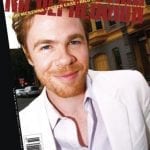Carolyn Mark – Absolutely free
“My mother used to read me absurdist plays as bedtime stories,” Carolyn Mark reveals, trudging along the sidewalks of her Victoria, B.C., neighborhood. She fires off a staccato “Ha!”, one of her many different laughs, but she isn’t kidding. Other kids got Dr. Seuss and Goodnight Moon; Mark was tucked in with The Bald Soprano. She never stood a chance.
Not that she had any concrete notion of how other children lived. Raised on an isolated diary farm in the British Columbia town of Sicamous, between Calgary and Vancouver, Mark had almost no social interaction, save with her family. “I didn’t get to hang out with other people until I went to school, because we lived so remotely,” she recalls. Overly excitable in her new surroundings, she spent much of that first academic year banished to the cloak room.
Her Austrian father had instructed her in piano from an early age. Still, Mark initially had no designs on a life in music. Instead, she studied theater while attending the University of Victoria. “My mom forced me to go [to college], so I picked the least offensive thing,” she explains. “I thought the theater department would be full of wild maniacs. Totally untrue.” Without pausing, she segues into several bars of “Nothing” from A Chorus Line, a number about the myth of method acting.
Upon graduating, Mark nixed her pending gig as a high school drama instructor and decided to form a band. She had never picked up a guitar or written a song, but she dove right in. The Vinaigrettes began as an all-girl quartet, and for seven years soldiered along playing a curious blend of surf-twang-pop. When the group dissolved in 1998, their curly-haired instigator simply kept going…right up to the present with her newest album, Nothing Is Free (on Mint Records).
Not long ago, musical colleague Geoff Berner suggested that Mark’s upbringing sounded suspiciously reminiscent of a cult: “It’s like you were raised with no future or past.” She laughs again. “My parents were very mysterious. They wouldn’t tell us much. Anything to do with money or numbers, for example, was off limits. We still don’t know my mother’s age, and she sleeps with her purse.
“It is funny, how it worked out,” she concludes. “I deal with people and numbers, and those are the two things I have no background in.”
Numbers are still a bug bear. (“Any number you can’t remember is five,” announces Mark at one point, apropos of a figure that eludes easy recall.) Depending on how you count, Nothing Is Free is her fifth full-length…or her fourth, seventh, or possibly thirteenth. In addition to a half-dozen albums with the Vinaigrettes, her credits also include The Other Women (recorded live at Seattle eatery Hattie’s Hat in 1998) as one-half of the Corn Sisters with Neko Case. She oversaw the making of a 2002 multi-artist tribute to the soundtrack of Robert Altman’s film Nashville, featuring performances by Case, Kelly Hogan, and members of the Sadies and New Pornographers. Albums attributed to Mark, with or without a band in tow, include Party Girl (2000), Terrible Hostess (2002), The Pros And Cons Of Collaboration (2004), and Just Married: An Album Of Duets (2005).
Regardless of its ordinal rank, Nothing Is Free is also a first for Mark: It’s the only album to feature her own name above the title that was made sans recording assistance from veteran guitarist (and former housemate) Tolan McNeil.
“He was going to record it and play on it, like always,” she explains. “And then he went out on a tour instead.” She lets out a little half-sigh, half-chuckle. “Honestly, we had spent so much time together, things were coming to a head. I could have changed the recording dates, but I felt kind of let down.” (They have since reconciled; McNeil even gave her his old car, a 1979 Aspen.)
She recruited another member of her sprawling musical family, Paul Rigby, to play guitar and mandolin. Someone new was brought in to oversee recording. She forged ahead. “And it kind of ended up being the greatest thing ever,” she marvels.
Mark’s signature strengths remain evident on Nothing Is Free, particularly her witty lyrics and keen eye for detail. With an acute understanding that comedy equals tragedy plus timing, she mixes bitter and sweet to taste on “The 1 That Got Away (With It)”, the biting “Pictures At 5”, and “The Business End”, the album’s melancholy opener. There are still autobiographical touches to her narratives — “Pirate And Shotgun” was inspired by three weeks spent in a crowded van with Po’ Girl and several other ladies — but they seem less specific, more universal, than before.
Where this twelve-song set truly surpasses previous outings is in its low-key sound. Performances feel warm and intimate, polished but not slick, even on the spacey, trip-hop-flavored closer, “Destination: You”. Strum takes precedence over twang. Mark’s poignant voice, a natural country instrument if ever there was one, has never sounded mellower, whether she’s vocalizing alone or harmonizing with violinist Diona Davis, Emilie Rhone, or Allison Russell and Awna Teixeira of Po’ Girl.
Most of Mark’s earlier work was recorded piecemeal, on the road or at McNeil’s Lucky Mouse Studio. Nothing Is Free, however, took shape at Beaver Point Hall, a community lodge on British Columbia’s Salt Spring Island. Tracks were laid down in four days (minus interruptions by regularly scheduled children’s karate classes and a women’s drum circle). An unlikely venue, perhaps, but wholly premeditated.
“I wanted to do it at the Hall, for sure,” says Mark. “I love to sing in there. I’ve been looking for that sound. Basically, it’s like performing inside of a guitar. There is so much wood, luxurious wood. That wouldn’t happen anywhere else in the world. It’s a B.C. thing.”




